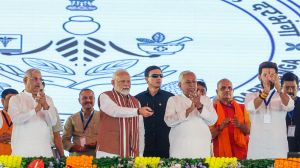Gujarat to double number of nature education camps
The government has decided to double the annual quota of nature education camps to 2,000 from the existing quota of around 1000.
 Nityanand Srivastava addresses the workshop organised by Gujarat Ecology Comission, in Gandhinagar on Sunday. (Express Photo by Gopal Kateshiya)
Nityanand Srivastava addresses the workshop organised by Gujarat Ecology Comission, in Gandhinagar on Sunday. (Express Photo by Gopal Kateshiya) Gujarat government will double the number of nature education camps for school students to 2,000 from the academic year 2023-24 and overhaul the nature education models to reflect the new realities and facilitate experiential learning, the state government said on Sunday.
“Presently we are covering around 1.5 lakh students in the nature education camps every year. But now, we are thinking why not reach out to 15 lakh students or even more with a marginal increase in funding for this activity,” Nityananda Srivastava, principal chief conservator of forests (wildlife) and the chief wildlife warden said, adding, for achieving this, the government has decided to double the annual quota of nature education camps to 2,000 from the existing quota of around 1000.
The PCCF was addressing the inaugural ceremony of “Nature Education: Challenges and Strategy,” a day-long workshop organised by the Gujarat Ecology Commission (GEC) for brainstorming and making recommendations to the government for overhauling the current programme of nature education.
Through World Wide Fund for Nature (WWF), India, naturalist Lavkumar Khachar and others had pioneered the concept of nature education and had started organising nature education camps in Gujarat in 1978-79. From 1879-80 onwards, the forest department of Gujarat also started organising such camps with an aim to help students understand nature and ecosystems and facilitate children’s bonding with nature. The state government has around 50 camping sites for such camps and Srivastava said that these camping sites will be upgraded and that two experts have already been hired for identifying areas of improvement. In addition to around 1000 camps organised by the state government, NGOs are also organising approximately 2000 camps annually with one camp typically having 45 to 60 participants.
But Srivasatava said that the existing nature education models are due some changes. “Basically, this is a subject of education. Look at the transformation the field of education in general has undergone with specialisations like engineering and so on. Therefore, we shouldn’t necessarily be following the nature education model of 1978 but rather update it or develop new ones.… And why keep the scope limited to just school students? Let nature education programme cover judges and journalists and everyone. We need support of not only the local communities living around our sanctuaries and National Parks but also of those who may be living in cities but professing ideology supportive of nature,” the chief wildlife warden said, adding, “Let’s use social media for continuity of nature education as attending one nature education camp may not be sufficient for a Class VIII student and may require reinforcement from time to time.”
Mahesh Singh, member secretary of GEC agreed. “The present models of nature education need a complete overhaul to achieve goals like making children curious about nature and make them start thinking about nature. An overhaul of the existing models are needed as changing lifestyles are detaching people from nature and this area requires attention. Let’s try to keep students away from screens of digital devices. If that’s not possible, let’s try and push nature education content in those devices,” said Singh.
GEC a body of the Gujarat government working towards sustainable development of the state through environmental upgradation and ecological management. The workshop was attended by representatives of NGOs working in the field of nature education from across the state and Singh said the recommendations of the workshop will be forwarded to the state government.
Bharat Pathak, the IFS officer who retired as additional principal chief conservator of forests suggested that nature education focus on macro picture. “Take education to ecosystem level for better results. For example, a student may be interested in birds only but it is important for him to understand the habitat and ecosystems which support these birds,” said Pathak, while stressing that nature education camps leave no adverse impact on ecosystems they are conducted in.
Pranav Trivedi, an expert in nature education activities said informal format is the best format for nature education. “No need to show children trees of 100 species during a nature education camp. It will be sufficient if students can observe only one tree properly, understand it, hug it… Meanings, functions, feelings etc are more important in nature education rather than teaching students names of species,” said Trivedi.
Participants were divided into four working groups which made suggestions and recommendations on identifying target groups for nature education, duration and syllabus for camps, using literature, toys, tools and games, camp sites and forest trails, pre-and-post camp feedbacks, utilisation of digital media, social media, citizen science etc for continuity in nature education etc.







